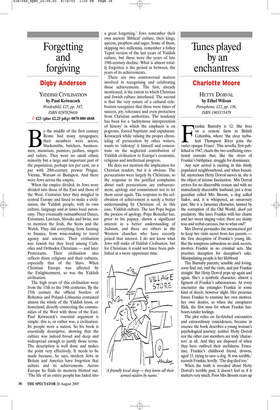Forgetting and forgiving
Digby Anderson
YIDDISH CIVILISATION by Paul Kriwaczek Weidenfeld, £25, pp. 347, ISBN 0297829416 ✆ £23 (plus £2.25 p&p) 0870 800 4848 By the middle of the first century Rome had many synagogues; their members were actors, blacksmiths, butchers, businessmen, musicians, painters, pedlars, singers and tailors. They were no small ethnic minority but a large and important part of the population, perhaps ten per cent, on a par with 20th-century prewar Prague, Vienna, Warsaw or Budapest. And there were Jews across the empire.
When the empire divided, its Jews were divided into those of the East and those of the West. Centuries later they mingled in central Europe and fused to make a civilisation, the Yiddish people, with its own culture, language and at times local autonomy. They eventually outnumbered Danes, Estonians, Latvians, Slovaks and Swiss, not to mention the Irish, the Scots and the Welsh. They did everything from farming to finance, from wine-making to travel agency and science. Their civilisation was Jewish but they lived among Catholics and Orthodox Christians — and later Protestants. Their civilisation also reflects those religions and their cultures, especially that of the Slavs. When Christian Europe was affected by the Enlightenment, so was the Yiddish civilisation.
The high years of this civilisation were from the 11th to the 19th centuries. By the 15th century the official borders of Bohemia and Poland–Lithuania contained almost the whole of the Yiddish heym, or homeland, directly connecting the communities of the West with those of the East. Paul Kriwaczek’s essential argument is simple: this is, or rather was, a civilisation. Its people were a nation. So his book is essentially descriptive, showing that the culture was indeed broad and deep and widespread enough to justify those terms. The description is well done and makes the point very effectively. It needs to be made because, he says, modern Jews in Britain and America have forgotten that culture and its achievements. Across Europe he finds its memory blotted out. ‘The life of an entire people has faded into a great forgetting.’ Jews remember their own ancient ‘Biblical’ culture, their kings, queens, prophets and sages. Some of them, skipping two millennia, remember a folksy Topol version of the last years of Yiddish culture, but these were the years of late 19th-century decline. What is almost totally forgotten is the period in between, the years of its achievements.
There are two controversial matters involved in recognising and celebrating those achievements. The first, already mentioned, is the extent to which Christian and Jewish culture interfused. The second is that the very nature of a cultural celebration recognises that there were times of success, joy, tolerance and even protection from Christian authorities. The tendency has been for a ‘lachrymose interpretation of history’ in which the emphasis is on pogroms, forced baptisms and expulsions. Kriwaczek while valuing the proper chronicling of persecution by other writers, wants to ‘sidestep’ it himself and concentrate on the neglected contribution of Yiddish civilisation to Europe’s economic, religious and intellectual progress.
He does not mention the implication for Christian readers, but it is obvious. The persecutions were largely by Christians, so the response to the justified complaints about such persecutions are embarrassment, apology and commitment not to let them occur again. The response to the celebration of achievement is surely a better understanding by Christians of, in this case, Yiddish culture. The last Pope began the process of apology. Pope Benedict has, prior to his papacy, shown a significant interest in a better understanding of Judaism, and there are others in the Western churches who have recently joined that interest. I do not know what Jews will make of Yiddish Civilisation, but for Christians it could not have been published at a more opportune time.

















































 Previous page
Previous page